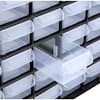Hi gang - another basics question from me  ...
...
After years of digital tinkering in spice I'm deciding to go all in this coming year and want to start doing what most of you do... lol... actually building stuff !! Sure, I'm good with an iron, comfy building kits etc... but these silly spice projects just seem cool and I want to start making them real.
!! Sure, I'm good with an iron, comfy building kits etc... but these silly spice projects just seem cool and I want to start making them real.
Silly as it sounds (to me), I'm only really just getting head around resistors (not basics, but more what all the crap in data sheets actually mean). Capacitors... I know what they do etc, know the types... but I'm not all over it in terms of tinkering.
I'm about to load up on bits and pieces to start breadboarding things, mainly compressor designs. But wouldn't mind just getting a random foray of capacitors for audio related fun - eq / filter related.
Is there a kind-of good "list" of cap values (and perhaps type / value combo) to have on hand? Like, do you all have a pile of "go-to" values and types for general use, or is it more project specific??
Almost changed the title to "general component values" ... but I'll keep it capacitor related. I might come back with diode and transistor questions!
... but I'll keep it capacitor related. I might come back with diode and transistor questions!
No worries if it's more project specific - happy to trawl through schems more to get a feel (which I've been doing, but super keen to just finish this mouser cart and thought I'd reach out in case you all just stock up on some standard values).
Many thanks for any guidance!!
After years of digital tinkering in spice I'm deciding to go all in this coming year and want to start doing what most of you do... lol... actually building stuff
Silly as it sounds (to me), I'm only really just getting head around resistors (not basics, but more what all the crap in data sheets actually mean). Capacitors... I know what they do etc, know the types... but I'm not all over it in terms of tinkering.
I'm about to load up on bits and pieces to start breadboarding things, mainly compressor designs. But wouldn't mind just getting a random foray of capacitors for audio related fun - eq / filter related.
Is there a kind-of good "list" of cap values (and perhaps type / value combo) to have on hand? Like, do you all have a pile of "go-to" values and types for general use, or is it more project specific??
Almost changed the title to "general component values"
No worries if it's more project specific - happy to trawl through schems more to get a feel (which I've been doing, but super keen to just finish this mouser cart and thought I'd reach out in case you all just stock up on some standard values).
Many thanks for any guidance!!




